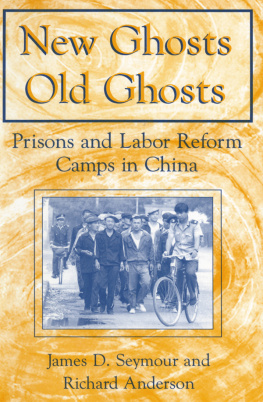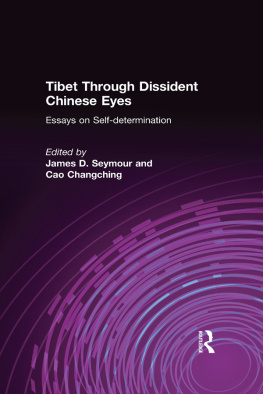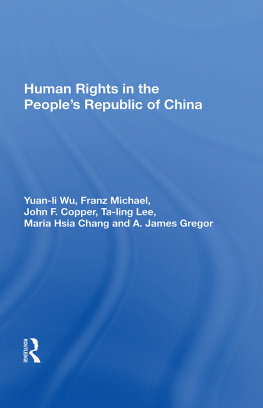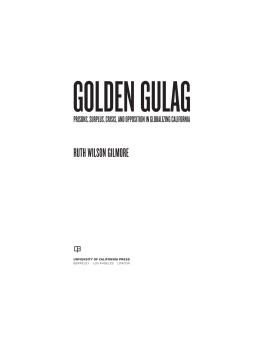An East Gate Book
First published 1998 by M.E. Sharpe
Published 2015 by Routledge
2 Park Square, Milton Park, Abingdon, Oxon OX14 4RN
711 Third Avenue, New York, NY 10017, USA
Routledge is an imprint of the Taylor & Francis Group, an informa business
Copyright 1998 Taylor & Francis. All rights reserved.
No part of this book may be reprinted or reproduced or utilised in any form or by any electronic, mechanical, or other means, now known or hereafter invented, including photocopying and recording, or in any information storage or retrieval system, without permission in writing from the publishers.
Notices
No responsibility is assumed by the publisher for any injury and/or damage to persons or property as a matter of products liability, negligence or otherwise, or from any use of operation of any methods, products, instructions or ideas contained in the material herein.
Practitioners and researchers must always rely on their own experience and knowledge in evaluating and using any information, methods, compounds, or experiments described herein. In using such information or methods they should be mindful of their own safety and the safety of others, including parties for whom they have a professional responsibility.
Product or corporate names may be trademarks or registered trademarks, and are used only for identification and explanation without intent to infringe.
Library of Congress Cataloging-in-Publication Data
Seymour, James D.
New ghosts, old ghosts : prisons and labor reform camps in China / by James D. Seymour and Richard Anderson.
p. cm.
An East Gate book.
Includes bibliographical references.
ISBN 0-7656-0097-8 (cloth : alk. paper)
1. PrisonsChina. 2. Forced laborChina. 3. Human rightsChina. I. Anderson, Richard. II. Title.
HV9817.S48 1997
365.951dc21 97-26806
CIP
ISBN 13: 9780765605108 (pbk)
ISBN 13: 9780765600974 (hbk)
Contents
by Fan Sidong
Charts
Maps
(See chart, )
Laogai organization:
| bingtuan | usually refers to the Xinjiang Production and Construction Corps (Xinjiang shengchan jianshe bingtuan) |
| division | shi |
| regiment | tuan |
| detachment | zhidui |
| brigade | dadui |
| squadron | zhongdui |
| group | dui |
| district group | qudui |
| squad | fendui |
| team | xiaodui |
| trio | sanrenxing |
Other terms, abbreviations, and conventions:
| jiuye | former inmates working near a prison |
| laogai | labor reform |
| laojiao | labor reeducation |
| PAP | Peoples Armed Police |
| PAFD | Peoples Armed Forces Departments |
| PLA | Peoples Liberation Army |
| RMB | renminbi (currency, also known as yuan) |
As used in this book, the term "laogai" may refer to the phenomenon, to the overall structure, or to a local prison system.
It has been very satisfying to work with James Seymour and Richard Anderson on the Xinjiang chapter of this book, and to have the chance to reveal to them my experiences in the laogai (labor reform prison camps) there. Although there may be a point here and there where my perspective differs from the authors, they have certainly been fair-minded, and scrupulous about the facts.
I was a political prisoner in China from 1983 to 1994, having spent most of that time in the Xinjiang laogai. Frankly, it was quite a miserable experience. Prisoners human rights were severely deprived. Most of us faced the double threats of starvation and overwork. Some of us used to occasionally try to protest. Once, I went on an eight-day hunger strike. Eventually I was able to meet with a laogai official. I reported to him the serious maltreatment to which prisoners were being subjected. The situation, however, did not improve. Another prisoner also wrote to the Minister of Justice, revealing that in one short period over one hundred prisoners had been subjected to brutal corporal punishment. Later, officials sent by the superior departments, accompanied by the prison guards who had actually committed the crimes, came to the prison camp to question prisoners about the incidents. Most prisoners were afraid to say anything at all, and thus the truth remained buried. Almost all inmates thereupon lost hope, and gave up on appealing to authorities. Some prisoners found various other ways to vent their frustration, such as collective violence, killing guards, and escaping from prison, and even committing suicide. Things went from bad to worse, with the disorder and gloom of the bingtuan laogai reaching an all-time low in the late 1980s.
many of whom have abused their authority and acted tyrannically. Some of them have even instigated prisoner thugs to engage in bloody and violent acts. The violations of the law on the part of the cadre-police were often worse than anything that had been committed by the convicted criminals. As a result, the laogai, far from reforming criminals, has in fact been nourishing criminals. The most ironic joke in northwestern China, and at the same time a fundamental reason contributing to the problem of increasing crime in Chinese society, lies in the fact that most convicts are controlled and reformed by other criminals wearing cadre police uniforms.
Luckily, I survived the ordeal and escaped from China. Now I am determined that the truth be revealed. As long as I am able, it will be my duty to reveal the facts about the Xinjiang laogai.
Likewise, Anderson and Seymour have sincerely devoted themselves to human rights issues in China. I believe that their detailed study and unbiased perspective will help the international public to know the truth. But I especially hope that this constructive book will be taken seriously by the Chinese authorities, and that it will encourage them to take steps to improve its human rights record with respect to Chinas prisons. Even in Chinas best prisons, such as those in Shanghai (where I also spent some time), conditions do not meet the past claims of the government outlined in the various white papers on human rights.
External factors really can promote change. As this book shows, the authorities have already had to take note of the concerns and critiques of Westerners toward Chinese human rights shortcomings. For this and other reasons, in recent years the national leadership has shown some concern for these problems, and has issued regulations aimed at alleviating the horrible atmosphere within the laogai. So far, though, these new policies cannot be considered fundamental improvement. The essence of any real change would lie in realizing the principle of the rule by law, which constitutes the only effective protection of human rights in any society. The situation in Xinjiang Laogai is still far from characterizable as rule by law.
The laogai is too complicated an institution to be explained in facile terms, and it would be easy to oversimplify the human rights problems. The authors are always conscious of this. Neither can there be facile solutions. It is my long-term conviction that, by means of thorough examination of Chinas laogai such as represented in this book, everyone can acquire deeper understanding and have more impact than would be the case if they simply relied on political means and economic leverage. At any rate, putting the truth out there is worth a try. The first step is to elucidate the stark facts. Concealment and distortion by anyone does nothing but harm to the cause of Chinas socio-political modernization.









